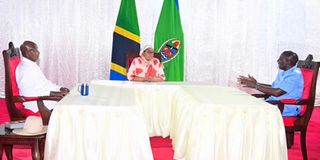EAC: Three to represent the rest

What you need to know:
- When the three met in Zanzibar, they represented the rest. After all, there are times when this region moves mysteriously.
The leaders of Tanzania, Kenya and Uganda met in Zanzibar on what was described as talks focused on integration issues within the framework of the regional bloc, the East African Community (EAC).
Of particular importance was the need to fast-track a political union for the partner states, a goal that has eluded the EAC for decades.
On paper, three countries met; however, in reality, the rest of the partner states ‘attended’ as well.
The meeting came at a time when there have been many forces pulling in opposite directions within the region, ranging from the raging wars in the eastern Democratic Republic of the Congo (DRC) to never-ending petty squabbles over trade with the countries that met in Zanzibar.
The meeting was variously described as one between the ‘original’ EAC partner states, while others saw it as a meeting between EAC’s ‘big three’.
Then there were those with a sense of humour with history, noting that the three countries formed the first EAC, then tanked it, and decades later decided to revive the regional project.
Yet others wondered whether this could lead to another ill-advised coalition of the willing.
There were also those who noted that Uganda’s Yoweri Museveni was the only president still alive and in office among the three leaders who met in March 1996 to continue forging the path for the revival of the EAC.
Since then, Tanzania and Kenya have had three presidents each.
The EAC has eight partner states.
However, the three that met in Zanzibar either have varying degrees of influence over the rest or at least have better relations with some of their partner states than the rest.
Kenya did not come alone at the table.
Nairobi has influence over Somalia and South Sudan for various reasons. Over the years, the political leaders of Somalia have lived and worked in Nairobi.
At one point, a transitional government in Somalia ruled remotely from Nairobi. Somalia’s entry into the EAC could not have been possible without the influence of Kenya.
The same case can be made for South Sudan, even though part of that story is in Kampala.
However, Kenya has business interests in Juba, and during the bitter civil war that ended with the partition of Sudan, the south was a buffer zone for Nairobi.
Nairobi hosted countless meetings to find a solution to the war between Sudan and South Sudan.
The DRC is wary of and hostile to Rwanda.
It is suspicious of Uganda and Burundi, despite agreements from time to time to cooperate in the fight against rebels roaming in the jungles of this vast region.
However, it could lend a listening ear to Kenya and Tanzania.
After all, Kenya stayed away for decades from the chaos and madness of the DRC.
That way, it does not have the baggage the rest of the EAC partner states have when it comes to the DRC.
Uganda has huge influence over the affairs in Juba.
It was instrumental in the war that ended with the formation of South Sudan.
If anything, nothing of significance happens in Juba without Kampala being aware.
While Uganda and Rwanda have had their share of ups and downs in recent years, it is also true that as things stand now within the region, Kigali may be willing to listen to what Kampala has to say over regional matters.
That is hardly the case in any other partner state.
That leaves Burundi
Tanzania has the ear of Bujumbura over regional affairs.
This has remained the case despite those in charge of these countries changing over the years.
Part of it has to do with the past, where the political settlements that put the country on a path towards ending decades of bloody civil war were discussed and settled in Arusha.
The rulers in Bujumbura and their political opponents see Tanzania as a second home or a neutral ground for them. A safe space.
When the three met in Zanzibar, they represented the rest. After all, there are times when this region moves mysteriously.
Erick Mwakibete is a socio-political commentator based in Dar es Salaam.





